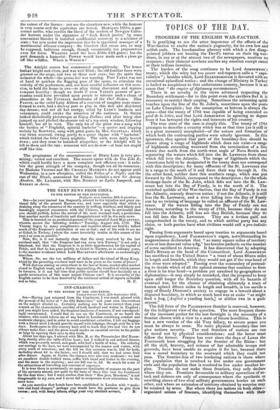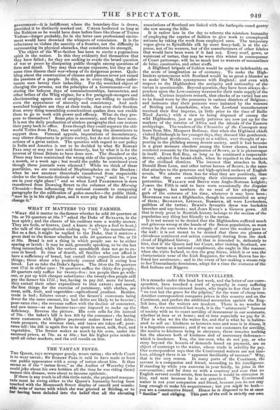TOPICS OF THE DAY.
PROGRESS OF THE ENGLISH WAR-FACTION.
IT is gratifying to see the utter impotence of the efforts of the War-faction to excite the nation's pugnacity, for its own low and selfish ends. The bacchanalian phrensy with which a few disap- pointed jobbers are beating the Devil's tattoo on their big war- drum, in one or at the utmost two of the newspapers, receives no response ; their clamour nowhere excites any emotion except ennui at their tedious iteration.
The burden of the song continues to be Lord ASHBURTON'S treaty, which the witty but too severe red-tapeman calls a " capi- tulation "; besides which, Lord ELLENBOROUGH is favoured with an occasional episodical notice ; and the change of Ministry in Turkey is hailed as auspicious to that unfortunate country, because it is an omen that "the empire of diplomacy recommences."
There is no novelty in the views advanced respecting the Boundary settlement—for to this point even the cavillers feel it is necessary to restrict their carping. Sometimes the animating spirit touches upon the line of the St. John's, sometimes upon the posts on Lake Champlain ; but the assumption at bottom is always the
same—that the treaty of 1783 was capable of being executed au pied de la lettre, and that Lord ASHBURTON in agreeing to depart from it has betrayed the rights and interests of his country.
The true state of the case is simply this. The treaty of 1783 attempts to describe a country which was at that time (as it still is in a great measure) unexplored—of the nature and formation of which both the contracting parties were utterly ignorant. In this ignorance, they agreed that part of the boundary-line should be drawn along a range of highlands which does not exist—a range of highlands extending westward from the termination of a line drawn due north from the north-west angle of Nova Scotia and separating the waters which fall into the St. Lawrence from those which fall into the Atlantic. The range of highlands which the Americans held to be designated in the treaty does not correspond with this description ; for many affluents of the St. Lawrence rise in a range to the south of it and force their way through it. On the other hand, neither does' this southern range, which was put forward by the British, correspond to the description ; for the whole drainage-basin of the St. John, which falls not into the St. Law- rence but into the Bay of Fundy, is to the north of it. The wretched quibble of the War-faction, that the Bay of Fundy is not the Atlantic, scarcely deserves notice : if not the Atlantic, it is still less the St. Lawrence, and a river falling into the Bay of Fundy can by no twisting of language be called an affluent of the St. Law- rence. If the waters falling into the Bay of Fundy are not American, according to the treaty of 1783, because they do not fall into the Atlantic, still less are they British, because they do not fall into the St. Lawrence. They are a tertiwn quid, not comprehended in the treaty, and to which neither party has any claim, or both parties have what civilians would call a pro indiviso right.
Passing from arguments based upon treaties to arguments based upon expediency, Lord PALMERSTON'S organ, notwithstanding its magnanimous declaration that " so many square miles of territory more or less does not value a fig," has become pathetic on the number of acres sacrificed to America. It has discovered that by adopting Hall's Stream as the head of the Connecticut, Lord ASH BURTON has sacrificed to the United States "a tract of about fifteen miles in length and, breadth, which they would not get if the true head of the river were adopted." Passing over the coxcombry of pretend- ing to decide which of all the upland streams that combine to form a river is its true head—a problem yet unsolved by geographers or diplomatists—it may simply be remarked, that the proposal to keep open still longer the Boundary question, with all its hazards of eventual war, for the chance of obtaining ultimately a tract of barren upland fifteen miles in length and breadth, is too servile a copy of Dandy Dinmont's anxiety to engage in a lawsuit about a disputed boundary, in which as much land was at stake " asi might feed a hog, [Anglia a yearling lamb,] or aiblins twa in a gude season."
The full force of the PALMERSTON thunder is reserved, however, for the belligerent view of the question. The most frequent theme of the incessant pother for the last fortnight is the necessity of a frontier chosen with a view to a state of future hostilities. This is but a new version of the old Tory fallacy, to secure peace you must be always in arms. No mere physical boundary-line can give nations security. The real frontiers of nations are run by moral not by physical considerations ; and the latter must follow the former. France has ever since the days of Louis the Fourteenth been struggling for the frontier of the Rhine : but all the skill, bravery, and science of her admirable troops and generals, have been unable to acquire it for her, because there was a moral boundary to the westward which they could not pass. The frontier-line of two bordering nations is there where the population that is resolved to live under one government ends and the population that is resolved to live under another be- gins. Treaties do not make those frontiers, they only declare where they are. Frontiers favourable to military operations of at- tack and defence are only of consequence where the apathetic or unwilling slaves of two rival military governments border on each other, and where an extension of territory obtained by surprise may be retained by arms. But where there are nations on both sides— organized unions of freemen, identifying themselves with their
government—it is indifferent where the boundary-line is drawn, provided it be distinctly marked out. C2ESAR hesitated as long at the Rubicon as he would have done before lines like those of Torres Vedras—longer probably, for in the latter case professional excite- ment would have drowned the whispers of conscience. It is the reluctance to violate the sanctity of a frontier, not the difficulty in surmounting its physical obstacles, that constitutes its strength.
The object of the War-faction has been to excite a pugnacious spirit in the nation. In this they evidently feel themselves that they have failed ; for they are seeking to evade the broad question of war or peace by dissipating public thought among questions of form and detail. They may thus escape exposure, but they at the same time disarm their war-whoop of its dangerous power. Quib- bling about the construction of clauses and phrases never yet raised the passions of a people. In this, as in every thing, these unfor- tunate men betray their imbecility. For the wretched object of changing the persons, not the principles of a Government—of re- storing the halcyon days of commissionerships, baronetcies, and other bribes of the Whig regime, for a few paragraph-mongers and electioneering agents out of employ—they are willing to sacrifice even the appearance of sincerity and consistency. And such wretched bunglers are they at their trade, that even their freedom from every thing resembling conscientious qualms does not enable them to go to work with power and efficacy. What do they pro- pose to themselves ? Some plan is necessary, and they have none. It is not the daily production of aimless paragraphs that can restore their party back to office. Even though they could separate the old- world Tories from PEEL, that would not bring the dissentients to support them. Personal appeals, imputations of inconsistency, may silence disputants in private society, but do not determine the actions of a great nation. The question with regard to our policy in India and America is not to be decided by what Sir ROBERT PEEL may or may not have said formerly, but by what it is for the interest of Great Britain to have done now. The Standard or the Times may have maintained the wrong side of the question, a year, a month, or a week ago ; but would the public be convinced even though those journals were silenced ? While we think of these puerilities, we are reminded of Mephistopheles on the Brocken when be saw amateur theatricals transferred from respectable circles to the fantastic festivals of witches; "now," said he, "you are in your right place!" and so when Lord PALMERSTON is seen transferred from Downing Street to the columns of the Morning Chronicle—from influencing the national counsels to composing paragraphs for the edification of gobes-mouches —the public think, "now he is in his right place, and it were pity that he should ever change it."



























 Previous page
Previous page